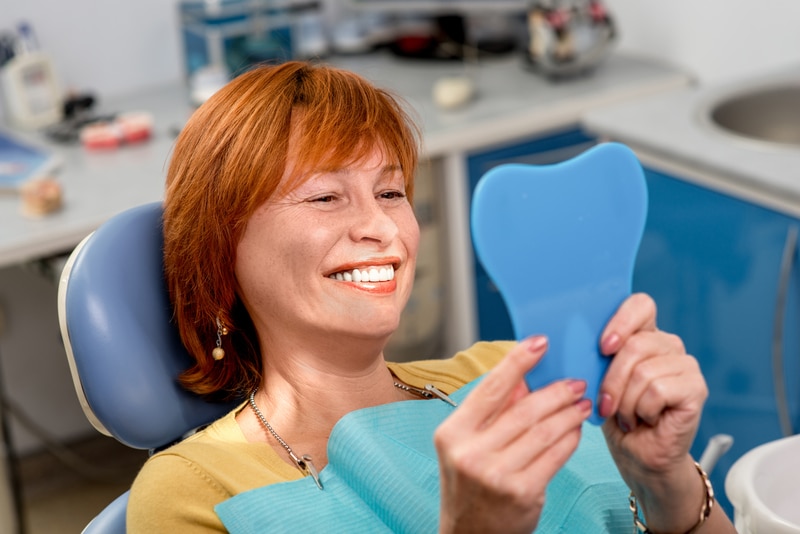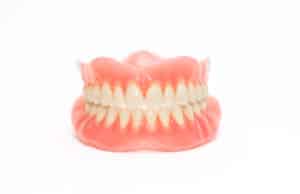Do You Need Dentures?


After age 65, thinning teeth as well as tooth decay and gum disease are more common. Those diseases can lead to tooth loss that becomes chronic without proper care. However, all is not lost if you have lost many of your teeth. You can still work towards great oral health with some changes to your oral hygiene routine and with dental services such as dentures.
Oral Health in the United States
You lose your set of baby teeth while you are young to make way for permanent, adult teeth. The adult teeth are referred to as “permanent” teeth, because that’s what they should be. Great oral hygiene can help you keep your natural teeth for life. However, tooth loss is becoming more a reality for people as lives get busier and oral hygiene is overlooked.
Dental professionals and health organizations stress the importance of brushing and flossing the teeth. This is vital if you actually want to keep your teeth. Sadly, studies show that only 3 in 10 millennials brush their teeth every day. Only 65% of adults see a dentist each year, and that doesn’t mean they’re doing it the recommended 2 times. Many people only brush or floss once a day instead of twice. Examples such as these lead to the high tooth decay and tooth loss statistics in the United States:
- About 92% or more of people have had their teeth decay by the time they reach adulthood.
- Skipping brushing and flossing leads to decayed teeth and gum disease, with the latter affecting more than 64.7 million American adults.
- When gum disease (inflammation of gums due to bacteria and plaque) gets severe, it leads to tooth loss. At least 120 million Americans are missing at least 1 tooth.
- 3.75% of American adults are missing all their teeth. Total tooth loss is referred to as “edentulism”.
- That percentage equals 36 million Americans without teeth.
- The estimated future tooth loss count is 200 million for the U.S., according to the American College of Prosthodontists.

Dentures for Total Tooth Loss
If you lose a tooth due to tooth decay, all is not lost. However, you don’t want that empty space in your mouth, as the opposing tooth could grow longer to fill the space. Other teeth may start to fall out from the lack of tooth support. Consider dental implants (a replacement tooth secured with an implant) to replace teeth that go missing. When total tooth loss happens, consider getting dentures.
Dentures are not only for those who are elderly, but for any patient affected by disease and decay. Dentures are custom-made appliances for patients that want their smile back, plus the ability to talk and eat like normal. Our dentures come in both partials and full sets, which means you can have complete upper or lower jaw dentures that replace your natural teeth. You can also get dentures for half of your jaw, if needed. Opt for dentures when you have enough tooth loss that it would be impractical to have an implant in every single place where a tooth has been lost. You don’t want to do that 28 or so times in your mouth.
Denture Process
Toothlessness makes eating, biting, chewing, and talking incredibly difficult. It can cause a very poor quality of life. Dentures come in two different options for patients and can help increase their quality of life for decades to come. You come in for your dental consultation and we do a full dental examination and dental cleaning. We will treat areas of gum disease and tooth decay as best as we can and take measures to make your gums healthy enough to support dentures.
Mouths significantly affected by gum disease may have gums that are way too mushy to support a dental appliance. This is why you want to continually see a dentist for dental problems to avoid your disease from getting to that stage. Partial dentures can be placed in a separate appointment after molds of your mouth have been taken. These provide artificial teeth secured in artificial gums, which prevent the remaining natural teeth from shifting over time. We attach the partials with clasps that anchor to your neighboring, natural teeth. They can be removed and placed back in the mouth with ease.
With full dentures, we must replace an entire set of your teeth in the upper or lower jaws. These dentures can be removable (ones that you take out each night), or they can be secured in your mouth with metal posts. The type you choose will depend on your needs and your level of health. Your custom molds are fitted to your mouth in a separate appointment. The suction the form-fitting dentures have is what helps hold them fast to the gums in the jaws.

Oral Hygiene Prevents Oral Health Diseases
Did you know that tooth decay is actually considered a disease by the Centers for Disease Control and Prevention (CDC)? The National Institutes of Health describe tooth decay as the most “chronic, prevalent disease” in the United States among both adults and children. This is concerning, as many people don’t even realize that cavities are a big deal. However, once a tooth has decayed, that part of it is lost. Once a tooth decays too much, it has to be removed or it falls out. Millions of Americans live with both tooth decay and gum disease, not realizing that it can make them painfully toothless in the years to come.
Good oral hygiene can prevent those tooth loss problems from happening to you. Brush your teeth at least twice a day, for 2 minutes at a time, covering all tooth surfaces really well. Floss 1-2 times a day, scraping your teeth as you go to remove stuck-on plaque. Use mouthwash to kill mouth bacteria and fluoride to strengthen the teeth. Don’t forget to schedule exams and dental cleanings with a dentist at least twice a year as well. You can do this by calling Dr. Ania’s office at 303-443-0998!


